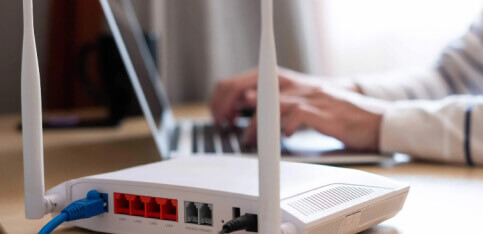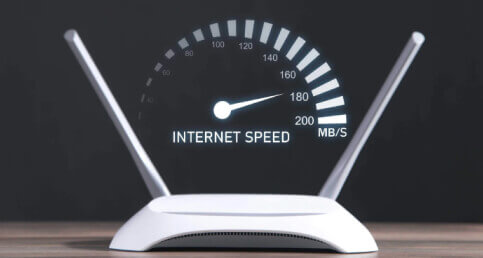How to Get an Accurate Internet Speed Test
An internet speed test should give you an accurate reading of how your internet connection is performing. Your speed test will show you your upload speed, your download speed, and your ping or latency.
To get your most accurate speed test results, use our helpful tips and follow the step-by-step process below. Going through this simple process will show you how fast your connection is when it’s under pressure.
Restart your modem and router
Modem and routers need to shut down every now and then and refresh their settings. When they do, you’ll get a cleaner and often faster internet connection.
Restarting your modem and router before running a speed test is the best way to get accuracy.
Think about all the devices that connect to the internet through your equipment at the same time. Your computer, phone, tablet, and game console are the most common ones. If you have multiple people in your household, you’ll have even more devices hooked up at once.
All these connected devices sometimes start manifesting symptoms that something is wrong with your connection.
For example, you may notice that your internet connection becomes sluggish when you’re browsing online, or your screen freezes frequently.
It never hurts to restart your equipment and give it a fresh connection.
Restarting your modem and router will help them return to optimal working status so they can maximize connection speeds. This fresh start will give you the most accurate results. After your restart, try not to open any unnecessary apps or windows before you run the speed test. Those apps will take up your bandwidth and you won’t get accurate results.

Remove any variables
Clear Browser Caches
A speed test works by sending data from your device to a local server and back again to your device. This data send is what measures your download and upload speeds.
When you don’t clear your browser caches, the speed test is unable to run smoothly due to the chunky files left behind by data packets. These leftover files can slow down the browser and prevent your tests from successfully measuring the speed of your connection.
Use a Wired Connection Instead of Wi-Fi
Using a wi-fi connection won’t yield the best results if you’re planning to check your internet speed. A wi-fi connection is often unreliable, and weaker because it travels through the air.
Before you run the test, make sure you use a wired ethernet connection and connect directly to your modem. Connecting through an ethernet cable will give you the best speed test results. You’ll develop a better idea of what your actual speed is on your network.
Your actual network speed is called “throughput,” and it often differs from your plan’s stated speed. But you may be pleasantly surprised! Sometimes your actual throughput is faster than your advertised plan speed.
Close Unnecessary Applications
During a speed test, it is crucial that nothing else is consuming bandwidth on your device. Any applications and programs you have open may affect your download and upload speeds. Double check that you don’t have multiple browsers open and that there aren’t any updates going on behind the scenes. You don’t want background programs affecting your internet speed test results when you first run the test.
Interpreting Your Internet Speed Test Results
Running a speed test can help you decide what you can do to improve internet speed at home and strengthen your network connection, especially for download speeds.
The best way to interpret internet speed test results is to know the minimum speed standard for high-speed internet, a standard often called “broadband speed.”
According to the Federal Communications Commission (FCC), the minimum speed for a connection to qualify as high-speed internet is 25 Mbps download/3 Mbps upload. If your speeds are below this standard, you don’t have high-speed internet.
Once your internet speed test is complete, the test will provide you with scores for upload speed, download speed, and ping speed.
Upload speed is the time your connection takes to send data to the server. Download speed is the time your connection takes to pull data from the server. Ping refers to the time that passes between sending a request to the server and the server’s response. Based on your speed numbers, you’ll be able to figure out your options to improve your overall network efficiency.

It’s not uncommon to see the message “Latency Test Error” at the end of a speed test. This error may occur because the local server is down.
Speed tests rely on the connection they have between your device and the local server. While speed tests sporadically contact local servers to make sure they’re working properly, the system doesn’t always realize right away when a server is down.
If you get this message and your test is inconclusive, fill out a support ticket on the testing website and try to connect to a different server to complete the test.
You need to measure both your download speed and your upload speed. Sometimes, the download speed test comes out fine, but the upload speed test doesn’t work.
A common reason for a problem with your upload test is an anti-virus program or firewall that’s intercepting the test traffic in your home network. If the firewall is properly installed, it won’t interfere with the test. But it does happen every so often.
You can temporarily disable the software while you’re running the test and activate it again once the test is over. If all else fails, restart your modem and router. It’s possible that they’re experiencing temporary connection issues that are showing up through the uploads.
If you don’t see a server available to make a connection for your test, the firewall on your computer is probably blocking you from getting access to a server. The easiest fix for this problem is to temporarily disable the firewall until your speed test is complete.
Decoding Internet Speed
Is My Internet Speed Fast Enough?
The speed of your Internet connection is measured in Megabits per second (Mbps). The FCC has set guidelines for what the minimum speeds should be for you to connect to the internet and have decent quality. Any speed higher than the FCC ‘s standard will improve the quality of your service, increase performance, and give you better download and upload speeds. If your internet speed exceeds 50 Mbps download and 10 Mbps upload with low latency, then your device speed is fast enough for common activities like browsing, streaming, and online gaming.
How is Internet Speed Calculated?
You can measure Internet speed in bits per second, or bps. Users with dial-up can expect their modem to reach speeds of up to 64 kilobits per second (Kbps), which is under 1 Mbps.
How is internet speed calculated for broadband connections?
Broadband connections are measured in megabits per second, or Mbps. A connection with decent quality usually has a speed of over 50 Mbps.
How Much Internet Speed Do I Need?
Your ideal internet speed depends on what you expect from your Internet during certain activities. For example, if you like online gaming, you should aim for a device speed of at least 50 Mbps download and 10 Mbps upload, with low latency. If you are not into online gaming, but you spend a lot of time streaming movies or hopping on video calls, then you’ll want a download speed of over 25 Mbps.
In general, an upload speed over 10 Mbps and a download speed over 50 Mbps is sufficient for most connections. If you have multiple real-time gamers or Ultra HD streamers in your home, you may want a download speed over 100 or 150 Mbps.

Why Run an Internet Speed Test?
Running a speed test on your computer or devices is always a good idea because it allows you to stay on top of your internet’s performance. You can make sure that your speed is up to par with what you expect from your internet plan.
If you ever experience latency on your devices or you notice that your internet service is less than stellar, a speed test can help you figure out the problem. You’ll be able to diagnose if there’s something wrong on your end, or if there’s a problem with your internet service provider.
How Does an Internet Speed Test Work?
Multiple factors determine whether a speed test site can successfully complete the test.
Server location
No matter what program you use to conduct the test, the first thing it will do is determine your location and find the closest test server to your device. The program will then send a ping (simple signal) to test communication, signal strength, and roundtrip time.
Download test
Once the ping is complete, the test will see how fast your computer is able to process a download by downloading a small amount of data to test speed and bandwidth. The main idea here is to strain your network and see how much it can handle during the download.
Upload test
The same thing will happen during the upload, except in reverse. Instead of downloading data, the speed test will upload data from your computer and calculate the speeds throughout the process. The testing occurs during a specific time frame so that the program can accurately measure how quickly your home network can upload data in a given time.
Can I Increase the Speed of My Internet?
Yes, you can. There are a number of tips you can try to boost your current device speed. The speed of your Internet depends on various factors, like the equipment you have, where you position the equipment, and whether someone is stealing your bandwidth. Connecting to the Internet through an ethernet cable can also increase the speed in certain instances. If all those factors check out and there is nothing wrong with them, it may be time to call your internet service provider and upgrade your plan to increase speeds.
Upgrading equipment
Most service providers let you rent equipment from them as part of your service plan. Often, renting equipment means that you get the most up-to-date routers and modems for your home network. However, if you own your equipment or you’ve rented the same equipment for over five years, replacing it can make a big difference.
Positioning the router
Where you position your equipment can significantly enhance signal strength and improve internet speeds on your devices. If you want to make sure you’re maximizing your router’s potential, it’s best to place it somewhere in the middle of your home. This placement will allow your network to distribute evenly and reduce latency issues. A simple change of router placement can greatly improve speeds within your network.
Make sure nobody is stealing your bandwidth
If you notice that your connected devices are experiencing high latency issues and a lot less speed than usual, it’s possible that an unauthorized person is using up your Wi-Fi. Make sure you secure your network with strong passwords and personalized settings. Always check to see what devices are connected to your network. If there are any you don’t recognize, change the password immediately to kick them off the network. Your speeds should then return to normal.
Yes and no. Many factors affect the results you get from a test, including the site, the number of devices connected, and whether you’re using a wired ethernet connection. A speed test is meant to be a barometer and not an exact measure of how fast your computer is actually able to process data. It’s important to compare results to your contract with your service provider and see where the device speed might differ.
Absolutely. For best results, experts recommend you perform multiple tests so you can get an average speed for download and upload speeds.
Try to run the test whenever there are no other devices or multiple connections on your network, as these could contribute to latency issues. Make sure the only device on your internet connection while you’re conducting the test is your computer. All other devices should be disconnected or turned off.
Multiple factors affect your device speed results. Here are some of the most common:
- Number of devices using your internet connection
- Conducting video calls or online gaming during the speed test
- Which browser you use while you run the test
- Location of the server
- 2 Mbps download: listen to online radio.
- 10 Mbps upload: videoconference (if connection is low latency)
- 25 Mbps download: stream Netflix and YouTube in 1080p
- 50+ Mbps download: stream videos in Ultra HD or 4K, video calls, multiple devices, online gaming (with low latency and 10 Mbps upload)
Speed Test Terms: Understanding Internet Jargon
- Bandwidth: maximum rate of data that can transfer across a network connection
- Bits: smallest units of data that a computer can process, a measurement used to discuss speed
- Bytes: a unit of measurement equal to eight bits, usually used to measure data storage rather than speed
- Download: transmission of a file from the internet to a computer
- Kbps: abbreviation for kilobits per second, which means one thousand bits per second
- Mbps: abbreviation for megabits per second, which means one million bits per second
- Gbps: abbreviation for gigabits per second, which means one billion bits per second
- Latency: a small delay in reaction between the time you request your computer to perform a task and the time your internet connection responds and delivers (usually measured in milliseconds)
- Packet loss: when a unit of data called a packet fails to reach its final destination on the network
- Ping: a test used to measure the latency (lag) of an internet connection
- Throughput: amount of data your internet connection actually delivers to you in a given time frame (usually measured in Mbps)
- Upload: transmission of a file from a computer to the internet

